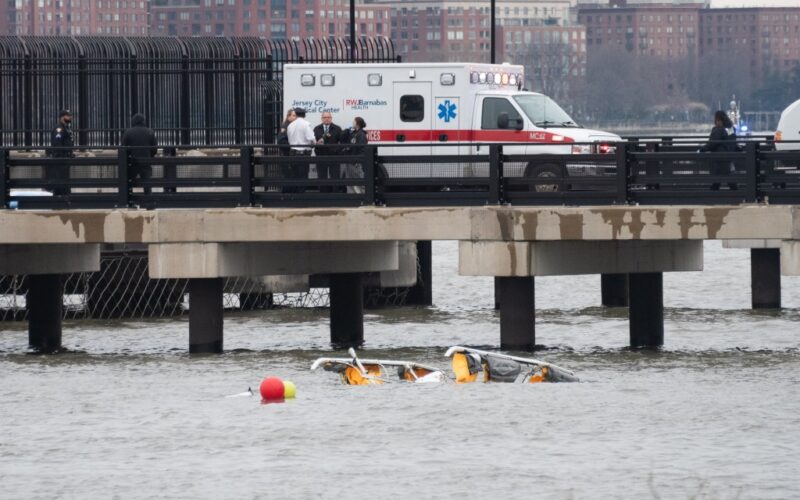A day after a tourist helicopter crash in the Hudson River killed six people including a Spanish CEO, his wife and three children, many local electeds renewed their calls to outlaw non-emergency chopper traffic above New York City — but Mayor Adams, whose support would be key to achieving any such prohibition, argued Friday there’s no need for an outright ban.
“It’s extremely dangerous to have choppers that are non-essential make flights over Manhattan,” State Senator Brad Hoylman-Sigal (D-Manhattan), a longtime opponent of non-essential flights, told the Daily News Friday.
“They’re putting us in in danger,” he continued. “If that crash yesterday had hit a school, a park or a workplace, this tragedy could have been far worse.”
City Councilman Chris Marte, a Democrat whose district includes the Wall St. heliport from which Thursday’s ill-fated flight took off, agreed.
“It was wholly preventable,” Marte said of the tragic crash. “This is the second such incident in six years involving tourist helicopters,” he said, referencing a 2019 Midtown crash that took the life of pilot Tim McCormack.
“Each one of these people could still be with us if our federal government took action to ban a completely unnecessary industry that continues to put lives at risk,” Marte said. “Helicopters should be reserved for emergency response, essential news coverage and public safety operations — not sightseeing or luxury travel.”
But the mayor was reticent Friday, saying safety could be achieved without an outright ban on non-essential helicopter travel.
“I remember in 1977 when the helicopter crashed into the Pan Am Building, we made adjustments and modifications,” Adams said on NY1 Friday morning, referencing the gruesome crash 50 years ago in which a runaway rotor fell from the rooftop of what is now the Met Life building, killing five.
“You can always adjust and modify based on these circumstances,” the mayor added.
“There were 17 crashes over approximately 40 years,” the mayor continued. “Those are numbers that you have to look at when you make these adjustments, and, you know, we don’t ban vehicles on our roads.”

In an appearance on 1010WINS radio, Adams said the city had thousands of tourist flights a year.
“People want to see the city from the sky,” he said.
“Use of helicopters in this city is more than just tourism, it’s also part of the business movements, CEOs and executives,” he added.
Any ban on non-essential helicopter travel over Manhattan would have to come from the Federal Aviation Administration, which governs the nation’s airspace.
A spokeswoman at the U.S. Department of Transportation — which oversees the FAA — confirmed that the agency had put temporary flight restrictions around the crash site, but there are no such restrictions over Manhattan.

Gardiner Anderson / New York Daily News
The mangled wreckage of a helicopter is lifted from the Hudson River in Jersey City on Thursday, April 10, 2025. (Gardiner Anderson / New York Daily News)
While the feds rule the sky, the city can regulate where helicopters are permitted to land — a move made by city officials who outlawed rooftop landings following the 1977 Pan Am crash.
Manhattan Councilwoman Gale Brewer, who has called for banning non-emergency helicopter traffic in the city since she was first elected to the Council in 2001, said she hopes to expand those limitations with a bill pending that would ban tourist flights from any city-owned heliports.
But she told The News Friday that her bill has stalled, much like a companion version introduced by New York Rep. Jerry Nadler in Congress.
“The federal legislation isn’t going anywhere and the City Council bill isn’t moving,” she said. “I frankly don’t know what else to do — it’s dangerous and it’s noisy,” she said.

Agustin Escobar, his wife, Merce Camprubi Montal, with two of their three children are pictured in an undated photo. The family was killed in a helicopter crash on Thursday, April 10, 2025. (Facebook)
Brewer also voiced outrage that the mayor would defer to “business leaders.”
“I couldn’t believe that,” she said. “You have to think about your constituents, and your constituents hate the noise. Why don’t you think about them first? It is shocking.”








